# Messaging Packs
XRUK produces messaging packs which XR groups around the movement can use for their own comms
# Lakenheath Peace Camp
MESSAGING PACK
FRAMING
[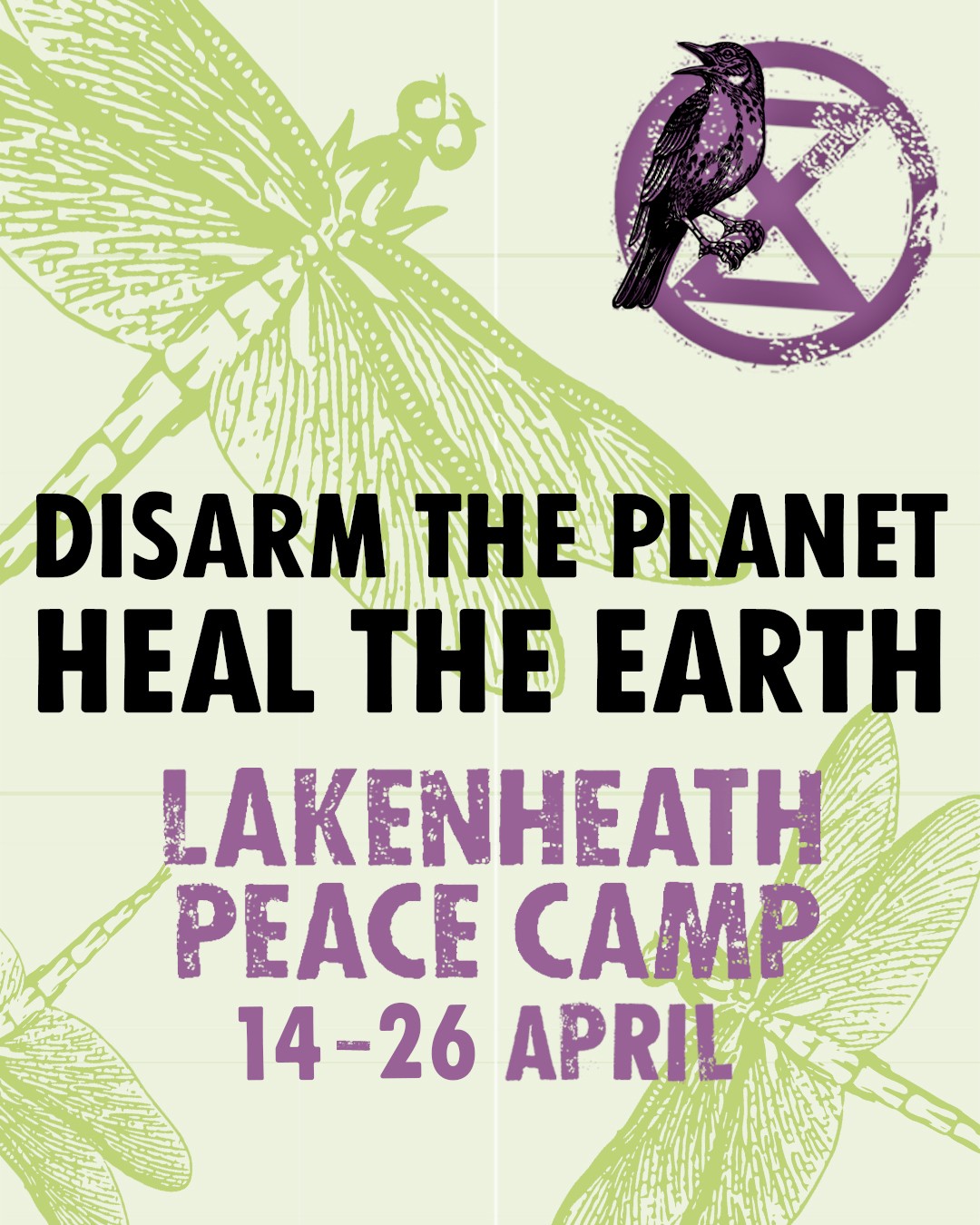](https://rebeltoolkit.extinctionrebellion.uk/uploads/images/gallery/2025-03/heal-the-earth.jpg)
Assets available from Lakenheath Peace Camp - XRUK Social Media Posts
What is it?
A two-week peace camp, protesting against the return of US nuclear weapons to Britain.
The camp will be entirely based on nonviolent direct action. It is organised by the Lakenheath Alliance for Peace (LAP) made up of 56 organisations, including XR Peace.
Key messaging
It's (pretty much) all about oil: The Lakenheath base has been involved in many of the recent wars for oil.
Escalating war: The return of nuclear weapons to the base will escalate tensions when global cooperation is needed more than ever in light of the climate and ecological emergency (CEE).
Time to come together, not fight: As climate change and ecological breakdown affect food and water supplies, it is essential that we find peaceful means to deal with societal collapse rather than defaulting to armed aggression.
Emissions from military: The military, in particular the US Air Force, is a major contributor to global greenhouse gas emissions.
Nuclear weapons harm to climate and nature: XR is protesting at Lakenheath RAF due to concerns over the storage and potential use of US nuclear weapons, which we know have an irreversible and catastrophic impact on the climate, nature and all life on earth.
Climate and environmental impact of the base: The base's operations contribute to military emissions and environmental degradation, which contributes and exacerbates the climate and ecological crisis.
Threats to peace are threats to climate and nature: We know the presence of nuclear weapons makes peace vulnerable. The connection between militarisation and ecological destruction is clear, the only way we are going to prevent climate and ecological breakdown is if we avoid war and conflicts.
War isn’t just fought on battlefields: Millions are forced from their homes by bombs, droughts, rising seas, and burning forests. War and climate breakdown displace people alike — two sides of the same coin, funded by the same governments.
What is the problem?
RAF Lakenheath is in reality USAF Lakenheath (i.e. American, not British) and is the largest US airbase in Europe. Its Air Force units maintain combat-ready wings that are pledged to NATO.
USAF Lakenheath is a base used to deploy weapons and military aircraft to conflicts around the world, including Kuwait, Iraq, Afghanistan, Serbia, Libya, Syria, the Middle East and East Africa. Now with nuclear weapons coming back, the potential destruction deployed from this base is even more severe.
With Donald Trump back in the White House, the threats to humanity and all life on earth are real.
The arms industry is highly profitable and governments do not want to stop this lucrative business; our present economic system needs wars to survive. The UK Government, amongst others, continues to sell arms and provide resources to countries like Israel, ignoring the toll on human life, biodiversity, and rampant emissions.
Why is XRUK getting involved?
Militarism is one of the central pillars of the carbon intensive, exploitative, industrial system that is driving the climate and ecological crisis.
Climate change causes war and war causes climate change. Environmental destruction and biodiversity loss follow in the wake of war. About 5.5 - 6% of global carbon emissions are from military activity. Climate change is already a significant cause of conflicts and is a key factor driving the refugee crisis, both from food shortages and climate induced conflicts. We cannot stop, or at least slow down, rapid climate and ecological breakdown without addressing militarism.
The developments at Lakenheath are actively promoting the expansion of the fossil fuel industry, accelerating the nuclear arms race and turning the UK and Europe into a nuclear front line, even more dangerous than the Cold War was.
For people concerned about defence
XRUK is a broad church and we do not judge those who are concerned about the nuclear threat from other countries. We are all scared, we all want to save the planet.
These are American nukes, on an American base. Who is in charge of the US right now? Do you still believe having these nukes here is a good idea?
There has been no consultation with the British public, the local communities, the local councils. There is no plan should anything go wrong with these weapons.
Militarism is expensive. At a time when we need to be spending on preparing for climate and ecological breakdown and trying to prevent the worst case scenario, resources are wasted on projects such as nuclear weapons at Lakenheath.
More nukes lead to more nukes: we have seen this all before in the Cold War: the nuclear arms race. Nuclear weapons brought in as deterrents lead to ‘the other side’ reacting by getting more nuclear weapons, and the cycle will never end. This doesn't deter anything, it just escalates the tensions.
[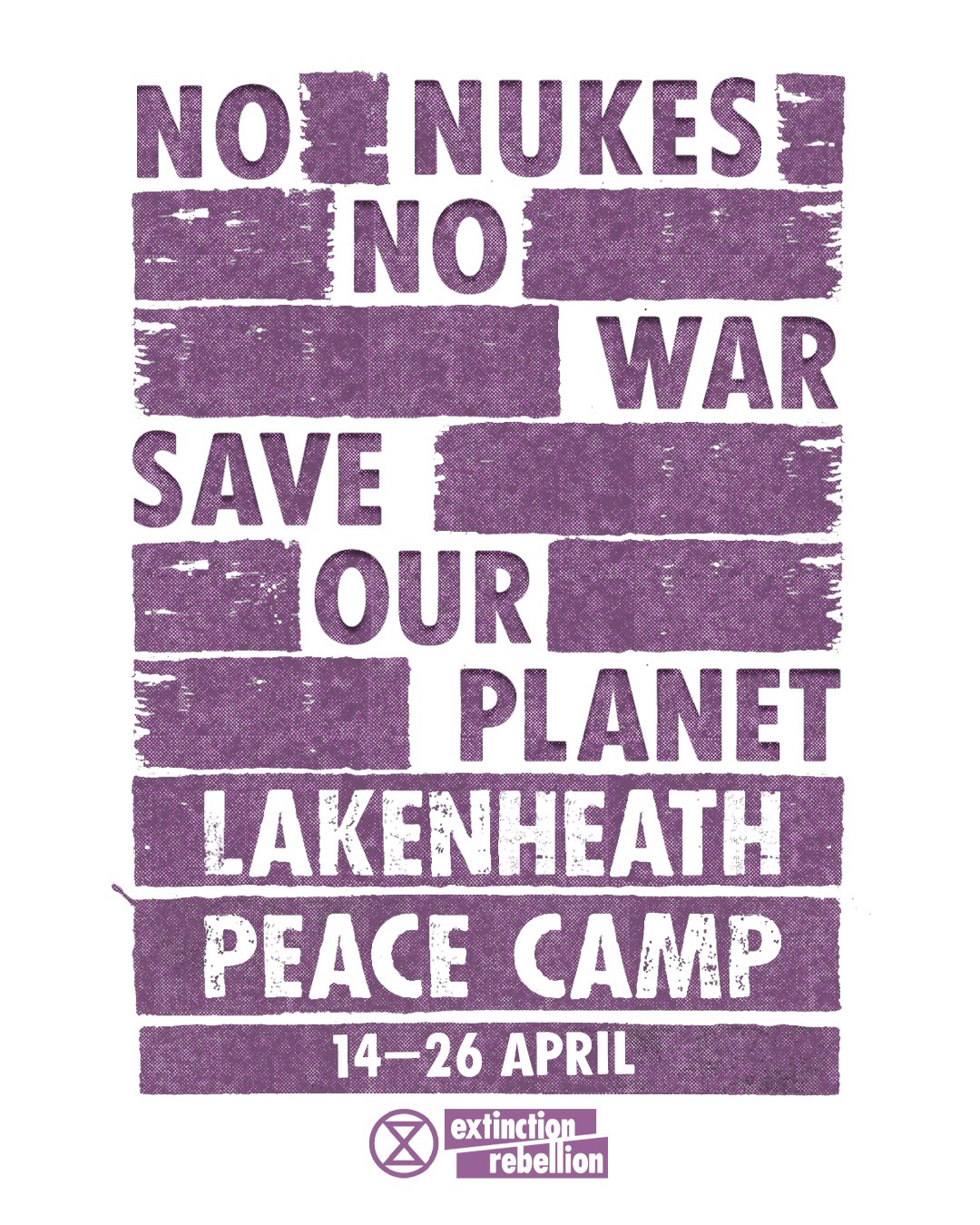](https://rebeltoolkit.extinctionrebellion.uk/uploads/images/gallery/2025-03/save-our-planet.jpg)
Assets available from Lakenheath Peace Camp - XRUK Social Media Posts
SLOGANS
Ideas for slogans, banners or placards to illustrate the link between war/military/weapons/nuclear weapons and the Climate and Ecological Emergency (CEE):
CEE related slogans:
WAR FUELS CLIMATE CHAOS
DISARM FOR A LIVEABLE PLANET
CUT WEAPONS, GROW FORESTS
DISARMAMENT = CLIMATE ACTION
CLIMATE CHANGE CAUSES WAR. WAR CAUSES CLIMATE CHANGE.
Save the planet related slogans:
NO NUKES, NO WAR, SAVE OUR PLANET
END WAR, SAVE EARTH
DISARM THE PLANET, HEAL THE EARTH
WAR POLLUTES, PEACE RESTORES
General:
STOP THE CHAIN REACTION
WAR PROFITS, PEOPLE SUFFER
DIVEST FROM DESTRUCTION, INVEST IN REGENERATION
Placards:
Stop Lakenheath Nuke Madness = Protect Our Planet
US Nuclear Warheads = Environmental Catastrophe – Stop the Arms Race
Choose Peace, Choose the Planet
People Before Profit
Planet Before Profit
TIPS FOR PLACARDS: Placards with some hard hitting facts always seem to do very well. Feel free to pick some from the list of facts below to add to your own placard.
SOCIAL MEDIA
Here you will find suggested hashtags, some suggested posts, and social media accounts of some of the allies attending the camp.
Key hashtags:
#Lakenheath
#PeaceCamp
#ClimateJustice
#WarKillsOurPlanet
#ExtinctionRebellion
Other hashtag ideas:
#ChoosePeace
#ChooseThePlanet
#PeopleBeforeProfit
#PlanetBeforeProfit
#ClimateAction
#ActNow
#WarPollutes
#NoNukes
#JoinTheMovement
#StandUpSpeakOut
#GlobalPeace
#Blockade
#PeacefulProtest
#NuclearWar
#RAFCentre
#ProtectOurPlanet
Social media post ideas
Post 1:
LAKENHEATH PEACE CAMP: TIME TO DISARM!
💣 Nuclear weapons are BACK at Lakenheath. The US is turning the UK into a nuclear front line—AGAIN. This is not a drill.
🔥 WAR FUELS CLIMATE CHAOS. The military-industrial complex is wrecking the planet while governments PROFIT from destruction. Climate justice and peace are inseparable.
👊 Join us for two weeks of action at Lakenheath Peace Camp—a camp of RESISTANCE, HOPE & DIRECT ACTION. Let’s show them we’re NOT backing down.
📍RAF Lakenheath, UK
IP27 9PS
📅Monday 14th April to Saturday 26th April 2025
No Nukes. No War. No Climate Collapse.
✊ Follow the Rebellion Broadcast on Telegram to stay updated!
#Lakenheath #RAFCentre #DirectAction #PlanetBeforeProfit #ClimateJustice
Post 2:
DISARM FOR A LIVEABLE PLANET
The US military is the world’s largest polluter—and they’re about to make things worse by bringing back nuclear weapons to Lakenheath. Nuclear war doesn’t just kill people—it kills ecosystems, poisons water, and accelerates climate collapse.
Climate change causes war. War causes climate change. It’s a toxic cycle we REFUSE to accept.
🚨 The solution? Mass disruption & resistance.
🌱 What do we want? Peace & regeneration.
🗣️ When do we want it. NOW.
👊 The first step? JOIN US at the Lakenheath Peace Camp!
📍RAF Lakenheath, UK
IP27 9PS
📅 Monday 14th April to Saturday 26th April 2025
Come camp, take action, and make history.
📢 Follow the Rebellion Broadcast on Telegram to stay in the loop or check out the Lakenheath website for more information!
#NoNukes #PeopleBeforeProfit #MakeHistory #ActNow #ExtinctionRebellion
Post 3:
MORE EMISSIONS. MORE DESTRUCTION. MORE RISK
We’re facing a #ClimateEmergency, and instead of funding green solutions, governments are bankrolling war. The UK and US are choosing weapons over wind turbines, and bombs over biodiversity.
🌱 Imagine if that money went into restoring forests, renewable energy or supporting climate refugees. But instead? They’re making sure we’re first in line for nuclear war.
👊 NOT ON OUR WATCH. Join the Lakenheath Peace Camp and take a stand for life on earth.
Disarm for a liveable planet.
📍RAF Lakenheath, UK
IP27 9PS
📅 Monday 14th April to Saturday 26th April 2025
✊ Action starts NOW. Be part of something BIG. Are you in?
Click the 🔗 in the bio for more information!
#PeacefulProtest #GlobalPeace #JoinTheMovement #XRUK
Links for Bluesky, Facebook and twitter (please note sharing links on instagram and TikTok posts doesn't work):
Find out more: https://xrb.link/Fu2thW60oZ2
Sign up here: https://xrb.link/g05Zb7A7A
Click here to donate: https://xrb.link/U9Co3K8087
Help create video content
Face to camera videos are super helpful for the XRUK social media team, you can upload them to the Live Action Content Telegram channel and/or use them on your own social accounts. The message and suggested posts and hashtags in the rest of this document are designed to help you do that.
🗣️ Suggested script topics for your video:
Hi, I’m [name], I’m here at Lakenheath Peace Camp today to tell those responsible for war and climate breakdown to disarm for the planet.
➡️ Then answer one or a few of these questions:
- What would you say to someone considering attending Lakenheath Peace Camp?
- What made you take action and Why are we here today?
- How does it feel to be part of this peace camp?
- What message are we sending to those responsible for climate breakdown/war?
- What would justice look like in this situation?
- Have you seen change happen as a result of actions like this?
🎥 Video tips:
- Interviews with interesting backgrounds
- Emotive clips really help to capture the moment and build the story of what it feels like to be there - use your emotion in interviews
- Please think about the video and audio quality! Look out for background sounds that make it hard to hear (like cars, people talking, drumming)
- 'B-roll' is also super useful - stewards, people handing out food and flyers, interacting with the public, laughing and dancing, anything that’s going on that we can add to the interview to make it more engaging.
- Longer clips - 15-30 seconds focusing on the same thing, really allowing viewers to soak up what’s happening
💡Here’s some inspiration from other actions:
- Ines at a Cut the Ties action
- Donna at Lakenheath
Allies on socials
COMING SOON
Organisation |
Bluesky |
Facebook |
Instagram |
LinkedIn |
TikTok |
X
XR Peace |
/ |
XRPeace |
/ |
/ |
/ |
@XRPeaceUK
More information on Alliance Organisations here: Lakenheath Alliance Organisations.
DESIGN
You will see our designs for social media scattered around this pack. You can download all social media designs here:
Lakenheath Peace Camp - XRUK Social Media Posts
Don't forget there are resources available to you to create your own assets using the XR colours and other design tools such as the design programme and more.
[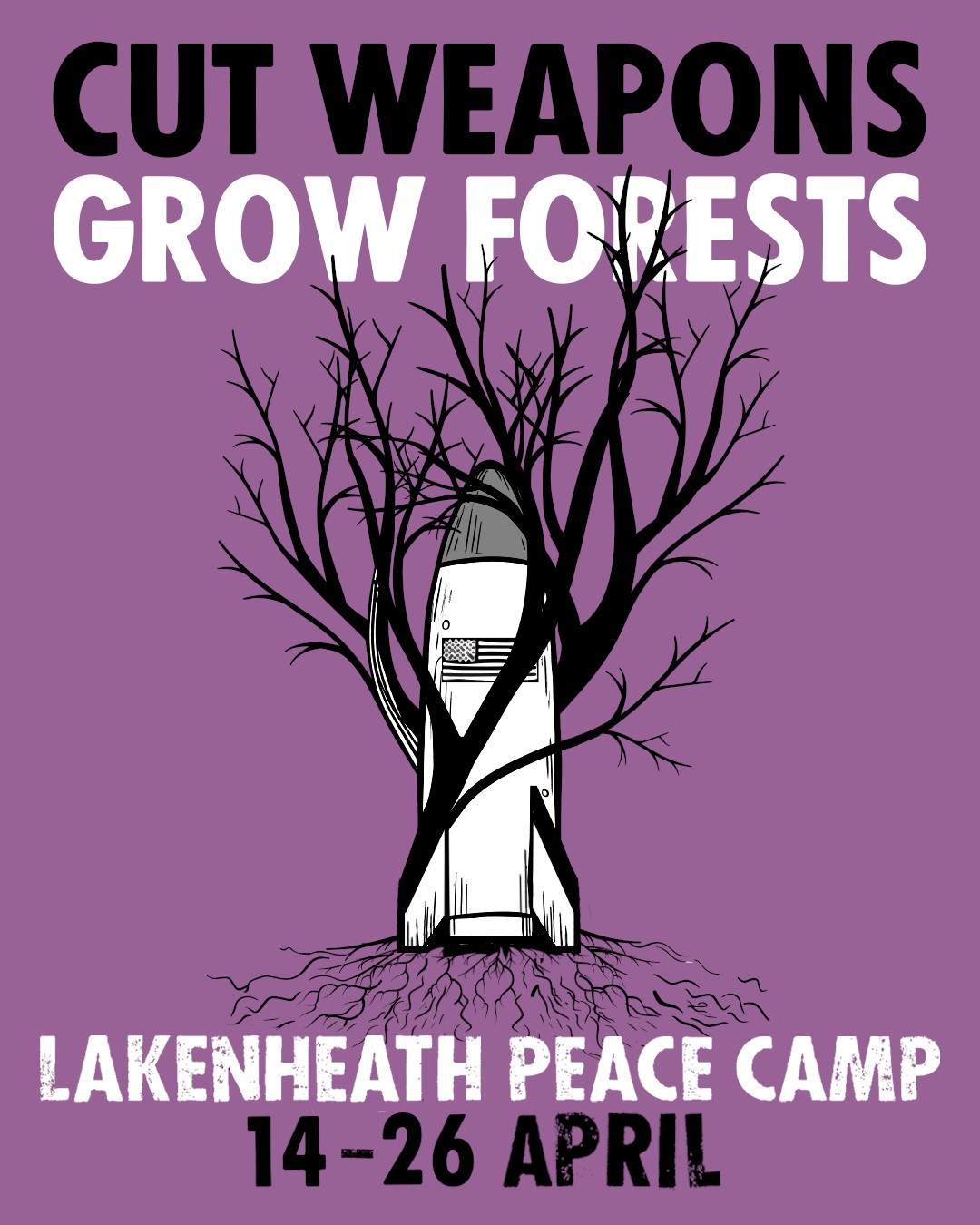](https://rebeltoolkit.extinctionrebellion.uk/uploads/images/gallery/2025-03/cut-weapons-grow-forests.jpg)
THE FACTS: NUCLEAR WEAPONS AT LAKENHEATH AND THE CLIMATE AND ECOLOGICAL EMERGENCY
Before nuclear weapons are even used
Even before nuclear weapons are used our environment is being poisoned, harmed and put at risk by the nuclear fuel cycle, weapons production, operations and transports.
The following examples from Lakenheath Peace Alliance website do not include greenhouse gas emissions from use of weapons in conflict:
UK’s ”production-based” military-industrial Greenhouse gas emissions (GHG) in 2018 were 6.5 million tonnes of carbon dioxide equivalent – that is greater than the “CO2 emissions of about 60 nations”.
If calculating greenhouse gas emissions of UK military spending in 2018 (the life-cycle “consumption-based” approach), the UK contributed approx 11 million tonnes CO2 equivalent.
The UK’s military carbon “bootprint” is comparable to the annual average mileage of 6 million cars.
BAE Systems Plc is a British multinational arms, security, and aerospace company. BAE Systems accounts for 30% of the total UK arms industry emissions.
One flight of a nuclear capable F35A fighter jet/bomber = two UK adults yearly emissions, average.
Carbon emissions of one military flight = approx 28 tonnes of CO2e.
The world spends over $90billion on nuclear weapons every year, global spending on nuclear weapons reached $91.4 billion in 2023. Over $2,400billion was spent on war in total. This is more than the estimated $2,000 billion a year needed to tackle climate change.
Each of the 30 F-35A warplanes at ‘RAF’ Lakenheath cost over $80million and over $30,000 per flight.
A single combat plane costs £58 million and burns through £28,000 an hour just to fly. It guzzles fuel at 0.6 miles per gallon—meanwhile, Lakenheath sees 15-30 flights daily, and that’s just during ‘peacetime’. When war ramps up? So do emissions, devastation, and death.
Nuclear weapons poison the planet for generations. Contamination from nukes lasts over 100,000 years. More than 100,000 tonnes of radioactive waste have already been dumped in the Atlantic. Out of sight, out of mind? Not when ecosystems collapse.
Impact of war
War causes climate change. During the US Iraq war, military equipment used 6 - 10 times more fossil fuels than the “peace-time” rate. War and military operations also have massive environmental effects due to toxic emissions due to destruction and burning forests, fields, ecosystems and people’s homes & businesses.
Military spending steals necessary resources away from public health, education, social needs, and tackling climate chaos.
A study by the Conflict and Environment Observatory (CEOBS) and Scientists for Global Responsibility (SGR) estimates that the military sector's carbon footprint accounts for approximately 5.5% of global emissions. This suggests that if the world's militaries were considered a single entity, their emissions would be more than major nations such as Russia.
If nuclear weapons are used
There is a lot of evidence, sadly, of the impact of a nuclear weapons on people, the environment, and all living things:
Evidence from test sites: Studies into the environmental impact of nuclear tests carried out in Nevada, USA, illustrate the impact of radioactive pollution on the atmospheric, aquatic, and underground environments. People exposed to nuclear radiation are more likely to suffer from long-term health conditions including cancer and skin burns. Pregnant women exposed have had babies born with malformations and impaired brain function, as well as cancer.
Evidence of actual nuclear explosions: The accident at the Chernobyl power plant in 1986 (equivalent to the detonation of about a dozen atomic bombs) and the bombs dropped on Hiroshima and Nagasaki in 1945.
When a nuclear bomb detonates, the 1 megaton blast kills or poisons everything within a two-mile radius.
Hiroshima: The extreme heat burnt everything in its path, including animals, trees, buildings and people. Many of those who did not die from radiation or burns later developed illnesses including cancers.
When people aren't dying of radiation related illnesses, some may starve to death from contaminated food chains and crops dying, resulting in famine.
The detonation of an atomic bomb creates radioactive dust that falls around the explosion site. Wind and water currents carry the dust across a much larger radius than the initial explosion, where it contaminates the ground, water supply and the food chain.
After nuclear explosions temperatures will shift, changing the climate with such a speed that nature won't be able to adapt.
Without people to maintain nuclear power plants and other existing nuclear weapons, the likelihood of more nuclear explosions is high.
ABOUT THE CAMP
Dates: Monday 14 - Saturday 26 April 2025
Location: RAF Lakenheath, Brandon Road, Brandon, Suffolk IP27 9PN
Getting to the camp - instructions on Lakenheath Alliance for Peace website
Travel Bursary for XR rebels - claim for public transport and car sharing costs
Full programme of the camp
Volunteer for an Action Support crew role
About the Lakenheath Alliance for Peace
Campaign for Nuclear Disarmament (CND)'s page about the peace camp at Lakenheath
About XR Peace
About RAF Lakenheath
FURTHER READING
International Campaign to Abolish Nuclear Weapons
Scientists for Global Responsibility (SGR)
Vandana Shiva books on practical ecofeminist, anti-colonialist actions to save Mother Earth
Western Shoshone info: Native Community Action Council
Campaign for Nuclear Disarmament (CND) UK
Campaign for Nuclear Disarmament (CND) Cymru
International Physicians for the Prevention of Nuclear War
LABRATS (test ban veterans)
SIPRI Yearbook 2022: Trends in world military expenditure
NIS Nuclear Information Service and @nuclearinfo
Rebecca Johnson’s report on TPNW and UK nuclear policies
Ban The Bomb
# It's 2025 now what?
[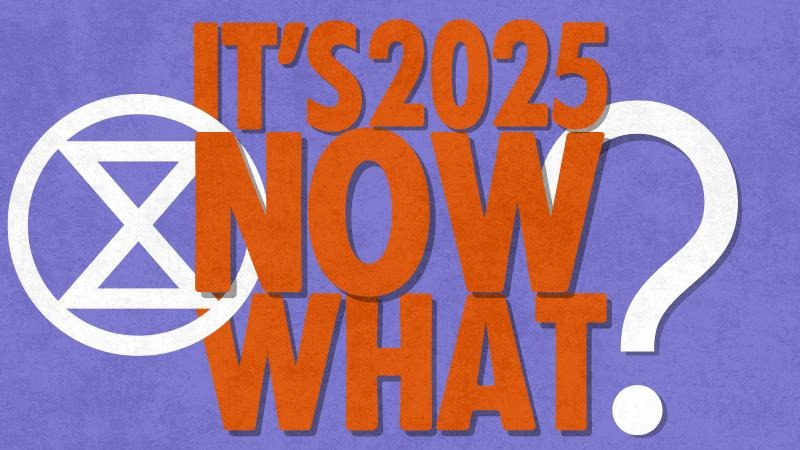](https://rebeltoolkit.extinctionrebellion.uk/uploads/images/gallery/2025-01/2025-banner.jpeg)
### Key Messaging
This pack aims to help you and your groups to talk about 2025, backed by science and research, helping you stay on point, while giving you space to bring your own voice in as well.
We will be adding to this pack over time, so do check back in for new information.
#### Key links
- Statement to the movement (XRUK website)
- 2024 Was the First Year Above 1.5C of Global Warming – Here’s How We Should Respond (Byline Times article)
#### What's the big deal about 2025?
In 2018, the XR co-founders, after much deliberation and conferring with leading scientists and other climate and environment experts, set the deadline by which the UK should reach net-zero carbon emissions for the year 2025. The science proved that we needed to rapidly decarbonise, there were already various blueprints from organisations proving it was possible, and for the sake of those already impacted by climate change (almost entirely communities in the global south) it was the morally right thing to do.
As to HOW this was going to be done, XR's third demand is that people should decide this together. Everyday people, who are impacted by the changes, who are not influenced by lobbyists and money, who think long-term, and work together as a group to find solutions that work for everyone: a citizens’ assembly.
Now it is 2025. And our demand has not been met.
#### Don’t sugar-coat the truth
There is no denying that we have reached a catastrophic state of impending collapse. The crisis has arrived on our doorstep sooner than anyone expected and it’s only getting worse.
Pretending otherwise is not only untruthful but also unfair to those who are already severely impacted by environmental and societal collapse - whether in Greater Manchester from floods, California from wildfires, or Sudan from extreme drought induced famine.
Let’s tell the truth, however uncomfortable it is.
#### It’s not too late
The narrative that “it’s too late why bother” is a tactic used by the fossil fuel industry and the right wing media to normalise the climate and ecological crisis and to make the public feel there is no point doing anything anymore. It is not too late. Every fraction of a degree makes a difference.
#### The emergency is here and now
The climate and ecological emergency is not something that will happen in the distant future in far off lands. It is happening here and now on our doorsteps.
If you need some examples, since the start of 2025 alone, we have seen extreme flooding all over the UK and beyond. Crops are set to fail because it is too wet, houses are becoming uninsurable because of flood risk. Extreme storms came back to back at the end of 2024, and each year is confirmed the hottest year on record year after year.
#### What could have been
A visioning exercise...
Imagine what 2025 could have looked like if we had achieved our three demands. A world where ordinary people make decisions together, not based on profit and personal gain but on helping your fellow inhabitants of this earth.
Imagine how much worse it could have been if we didn’t act, if XR never came to be. Who knows? Maybe the government still wouldn’t have declared a climate emergency for example. We have achieved some incredible things over the last six years which have left a lasting impression. Let’s celebrate those achievements, the big and the small because it could have been so much worse.
### Key Facts
Byline Times: 2024 Was the First Year Above 1.5C of Global Warming - Here’s How We Should Respond
This piece was written by the XRUK Press team in collaboration with many people from different circles. It contains some killer facts that will be useful for interviews, rebuttals, or even just conversations on the street during an action:
- 2024 was the first year that global average temperatures exceeded 1.5°C above pre-industrial levels according to the EU’s Copernicus Earth Observation Programme. In fact it’s worse than that. It’s 1.6°C.
- Every 0.1°C places 100 million people (or more) in unlivable temperatures.
- BUT this also means that any 0.1°C temperature increase we avoid, could save 100 million people.
- It will get worse faster: heating amplifies feedback loops in the climate system, and as we move past 1.5°C we increasingly cross tipping points. This means that things will not only get worse, but will get worse faster.
- A threshold could be passed where feedbacks uncontrollably tip the system into a Hothouse Earth scenario resulting in 4-5°C higher than pre-industrial levels and with sea level rise of 10-60m higher than today.
- Feedback loops are not yet fully integrated into climate models. Current emissions plans "might fall short in adequately limiting future warming,” leading climate scientists warned in October.
- One explanation concerns recent regulations which have cut sulphur pollution in the shipping sector. Sulphur emissions had been masking the true rate of global warming, but have now been reduced. This is affecting cloud cover (and hence reflective capacity) in the northern hemisphere and tropics. James Hansen has been talking about this for some time and it is now getting wider traction.
- Yes, too late to stay within 1.5C - No, not not too late to prevent the worst outcomes: “Avoiding every tenth of a degree of warming is critically important.”
- There is already evidence that that the cumulative effect of stronger policies around the world can make a difference: Climate Action Tracker estimates that, since the Paris Agreement was signed in 2015, stronger national climate policies have brought their end of century temperature projected temperature rises down from 3.6°C to 2.7°C. Sadly, this ambition has stalled since COVID.
- Concerned citizens have to keep going but we also need to raise our game strategically.
- Only rapid action to phase out fossil fuel use can impact the trajectory we are on.
Examples of tipping points:
- Melting of the Greenland and West Antarctic ice sheets will catastrophically raise sea levels.
- The death of warm-water corals destroys a natural carbon sink.
- The melting of permafrost releases powerful greenhouse gasses.
- The breakdown of Atlantic ocean circulation changes how heat is distributed across the planet.
### Social Media
You can use the following link to download XRUK’s social media posts from Canva or ‘copy’ and ‘edit’ the below Canva file as you wish:
XRUK Social Media Post | It’s 2025 Now What
Alternatively you can share XRUK's posts on Twitter, Bluesky, Instagram, Facebook and TikTok:
Handle
@XRebellionUk
Hashtags
#HereAndNow
#NotTooLate
#ExtinctionRebellion
#TellTheTruth
### Press
We will be adding to this list, but here are some useful articles to help with the 2025 messaging:
- 2024 first year to pass 1.5C global warming limit, BBC, 10 January 2025.
Announcement of the Copernicus Institue's report, which should have made headlines, but of course didn't.
- Extinction Rebellion: What do they want and is it realistic?
The BBC's response to XR's 2025 demand back in 2019: The BBC, and all the other media, immediately picked XR up on the 2025 target, which they all said was unrealistic. The truth is, we never even tried. Imagine if we had tried, and it all would have achieved net zero a few years later. We would still be in a better position than we are now.
A useful quote from that article:
"The honest answer about whether you can hit net zero by 2025 is that until you go for it, nobody knows if you'll get there," said Andrew Simms from the Rapid Transition Alliance, which promotes solutions to climate change that could transform the world over the next 12 years.
"We tend to forget what can be achieved in really compressed periods of time when the whole of industry and the whole of government put their minds to it. It's like the speed with which we responded to the financial crisis in 2008."
- 2050 is too late—we must drastically cut emissions much sooner
In this article Tim Jackson, an ecologist and economist, talks about the practical and ethical reasons why a country like the UK should decarbonise much faster than some other countries due to its historical carbon emissions and responsibility for emissions elsewhere in the world.
- Can we reach zero carbon by 2025?
The Centre for Alternative Technology Charity (CAT) outlined plans that could have seen us reach net zero by 2025 (or roughly 2027). It is clear that the only thing that prevented that from happening was the political will. To be told rapid transistion cannot be done is implying that is physically cannot be done - that is simply not true. If our government truly wanted to, we could have been there by now, or at least been well underway.
# "Rebel for Truth" Messaging Pack 2024
[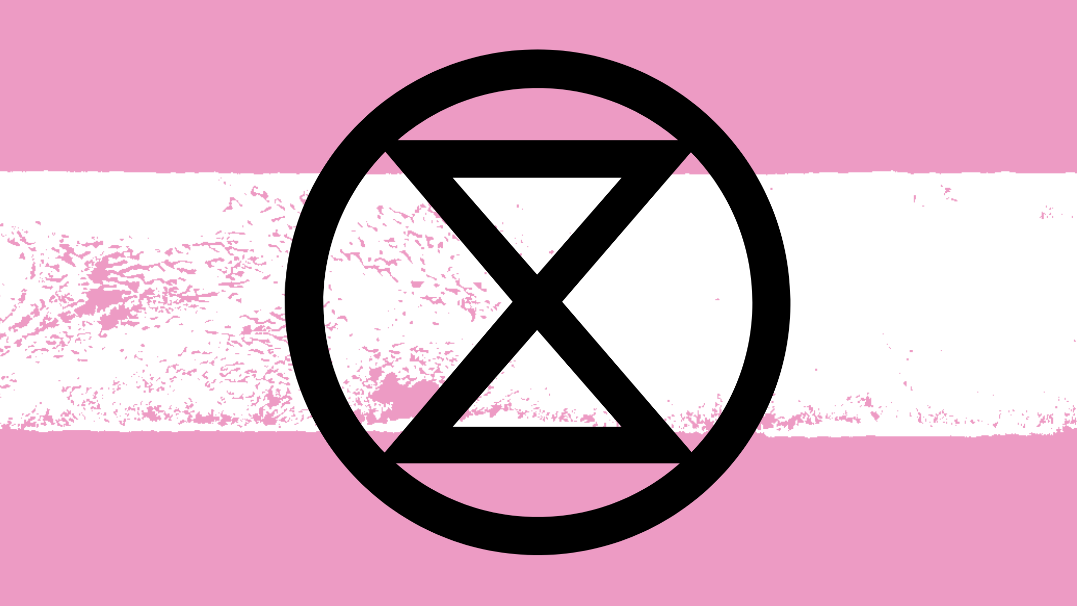](https://rebeltoolkit.extinctionrebellion.uk/uploads/images/gallery/2024-04/r4t-1.PNG)
### Messaging Pack 2024
It’s nearly 5 years since the Declaration of Rebellion. Why are we still having to talk about this shit?
The Public Order Act has changed the landscape in which we are taking action. It is intended to make people feel powerless - but we aren’t. They want people to forget the **change** they can create when they come together. We are inviting them to remember.
Across the country communities of **resistance** are growing. Rebels in local groups are building alliances, and taking actions around local issues that matter to them, culminating in coordinated action on the last day of the month - every month.
We have always sounded the alarm, and now we sound the alarm for **truth.** Our system is broken, and all those in power are complicit. With truth we will make a stand, a **bold** and rebellious stand, for all life on earth. The lies about the climate and ecological crisis, what’s causing it and what’s being done about it. The lies that justify inequality, racism, injustice, colonialism, speciesism and ecocide. The lies that vilify action and perpetuate apathy.
What is the unifying thread that unites an action against an incinerator in Edmonton and tree cutting in Wellingborough? It is that we are all Extinction Rebellion, bound by the same demands, principles and values.
There is one answer to the situation we are in, an antidote to the lies and misinformation. It is the answer because we believe in the power of people - we demand a **Citizens’ Assembly** on Climate and Ecological Justice.
There is power in unity and many voices speaking as one, but there is also strength in the words that connect to your community. Consider this page a toolkit. If it contains things that help you get the job done then use it, but it is an **invitation not an instruction.**
[](https://rebeltoolkit.extinctionrebellion.uk/uploads/images/gallery/2024-04/r4t.PNG)
#### Why are we Rebelling for Truth?
Since XR first burst onto the streets we have said “Tell the truth and act as if the truth is real”. Truth is the antidote to climate lies and climate liars. Truth is strong. Truth is defiant. Truth is unapologetic.
We non-violently challenge and disrupt the climate villains whose lies are stopping the scientific truth from driving an urgent and just transition. With humour, with creativity, with unity, we present an inspiring alternative vision to the toxic system that allows climate lies to flourish as the crisis destroys our global life support system before our eyes.
##### Are You Okay With This?
Hell no. Greenwashing and inaction are everywhere. This is a question both for the climate criminals, and for the public.
This year has featured more evidence of climate breakdown in the form of a record-breaking cyclone in south-eastern Africa, raging wildfires in Europe and an unbearable heatwave across Asia. On our doorstep effluent is knowingly pumped into our rivers and pollution into our air as the government takes more steps to silence dissent. Once you’ve looked truth in the eye, the next question is what are you going to do about it?
[](https://rebeltoolkit.extinctionrebellion.uk/uploads/images/gallery/2024-04/r4t-2.PNG)
#### We must Decide Together
When you can’t trust those in power, the people are the answer. Our three demands are a pathway to change. Citizens’ assemblies (CAs) are the antidote to the lies and the villains, putting the decisions needed in the hands of the people.
We are trapped in a system that is outdated and out of touch. Citizen's assemblies are the alternative, putting decisions in the hands of the people. This is the first step in the system change we demand. In a time of corruption and greed, ‘reasonable’ starts to look revolutionary.
Remind yourself and everyone else about why CAs are the answer. Check out the resources on our website or YouTube.
Need some help with how to talk about CAs? Read more here.
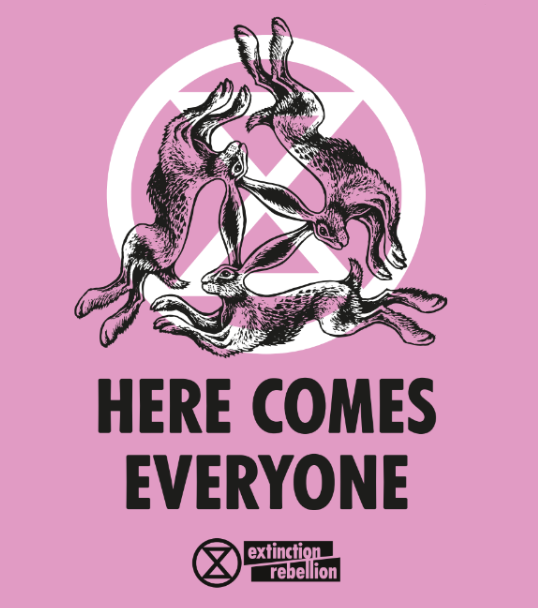
#### Flyers
Flyers have been produced that align with this messaging.
You can download them here to print yourself, or order them from the outreach order form.
These flyers are available in Welsh through the 'print yourself' link above. If there is a language you would like outreach materials in please email **media@rebellion.earth**
#### Social Media
Find social media assets for you or you group to use here.
##### Hashtags
#RebelForTruth
#AreYouOkayWithThis
#CitizensAssemble
#DecideTogether
#UniteToSurvive

#### Paint the Symbol - Here Comes Everyone
In 1996 a small group of people who went on to lead the Serbian resistance took to the streets and spray painted their symbol, and the word “otpor” - resistance. They knew that under an oppressive regime people wouldn’t feel they could come out onto the streets unless they thought that everyone else was. The symbol appearing everywhere created the movement it hinted at, which in turn overthrew a dictator.
The extinction symbol is already iconic. Recreate it on walls, in windows, anywhere you can imagine. Let’s reignite the paint the symbol campaign with love, creativity - and of course a little bit of mischief.
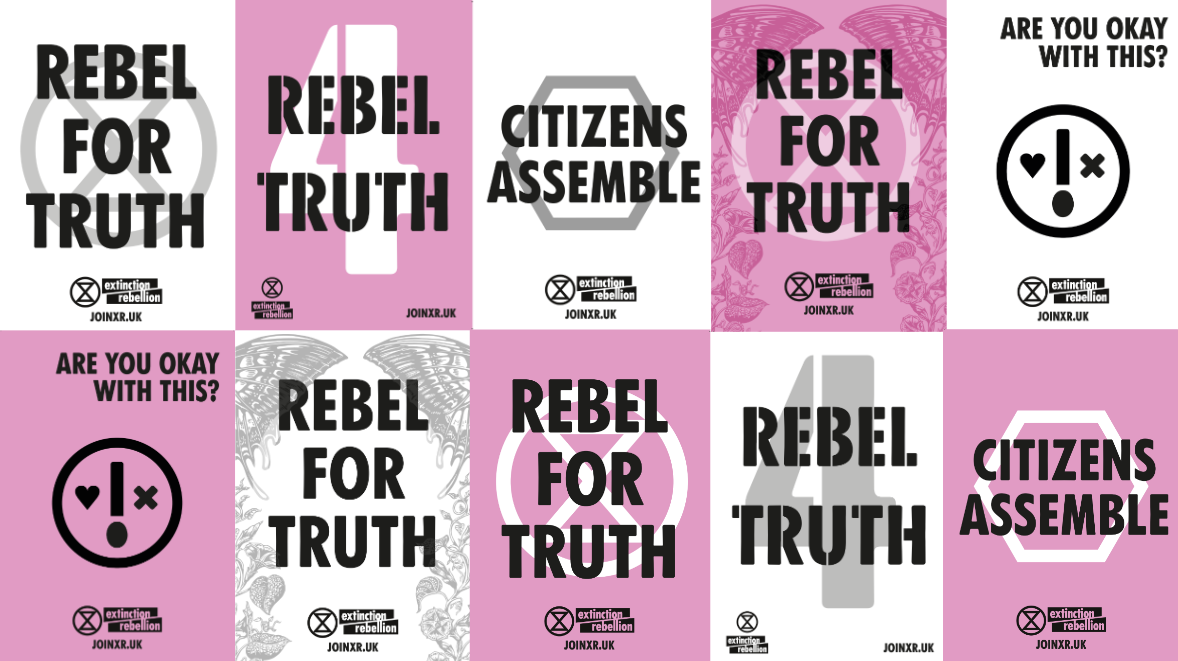
#### Posters
Spread the message even further. Stick a poster in your window, take a bundle to flypost, or anything else you can think of.
Find some colourful ones and some black and white ones suitable for home printing here (would look fab printed onto pink or green paper!). Post them everywhere you can as a show of pride. Normalise being in rebellion!
#### Fonts
**Karla**
You might have noticed this font popping up instead of the classic Crimson. That’s because serif fonts are harder for many people to read, especially if they are dyslexic.
When we say we welcome everyone, we want them to feel welcome too! Get it here.
**Fucxed Caps**
Get the classic Fucxed Caps here.
#### Colours
The XR Design Programme has a beautiful array of colours, but sometimes simplicity speaks for itself. Leaning into our signature pink, complemented by the classic green is a combination that never goes out of style.
Using the same colours as other actions for your banner or social media graphics is an easy and simple way to tie what you’re doing and saying into the wider narrative, even if the rest of your messaging is tailored to a specific campaign or local issues.
[](https://rebeltoolkit.extinctionrebellion.uk/uploads/images/gallery/2024-04/r4t-6.PNG)
#### Flags
The Extinction Symbol is iconic and uniting, and never more so than when it is fluttering in the wind.
Find everything you need to know about making flags here and a video on how to block print the symbol on them here.
### FAQs
##### What is XR up to?
Thanks for asking! We’re pretty busy. We are implementing our new strategy, and diversifying both our tactics and our spectrum of support. That’s not the sort of magic that takes place overnight. XR holds a unique position among the ecology of environmental groups - we are the only one with the potential to truly be a mass NVDA movement, capable of forcing the government to meet our demands. And to achieve the change necessary we need everyone. That means growing our local groups, building alliances and connecting with communities that previously we have not managed to engage with.
##### Did The Big One even do anything?
Movements that last are movements that adapt and change, and in XR we flow like water. This means adapting our strategy to an over-changing environment, because doing the same thing all the time just isn’t going to do the job.
In order to keep up the pressure we need to be unafraid to diversify our tactics in response to an ever-changing climate. This keeps us fresh and radical, and keeps those in power on their toes. We know that what we achieved in April scared those in power, because it was unexpected, and the unexpected isn’t something they can predict and plan for. Now we need to build on that.
##### What about our theory of change?
A theory of change is not a monolith, it is not a thing that is written and remains rigid and unbending. Reflecting and learning is built into our principles and values for a reason, and nowhere is this more true than our strategy. Looking to all those who have stepped into resistance is great, but it doesn’t tell us what to do now - because we’ve never done this before. And everything is at stake.
# War & Peace (messaging connecting conflict & climate)
[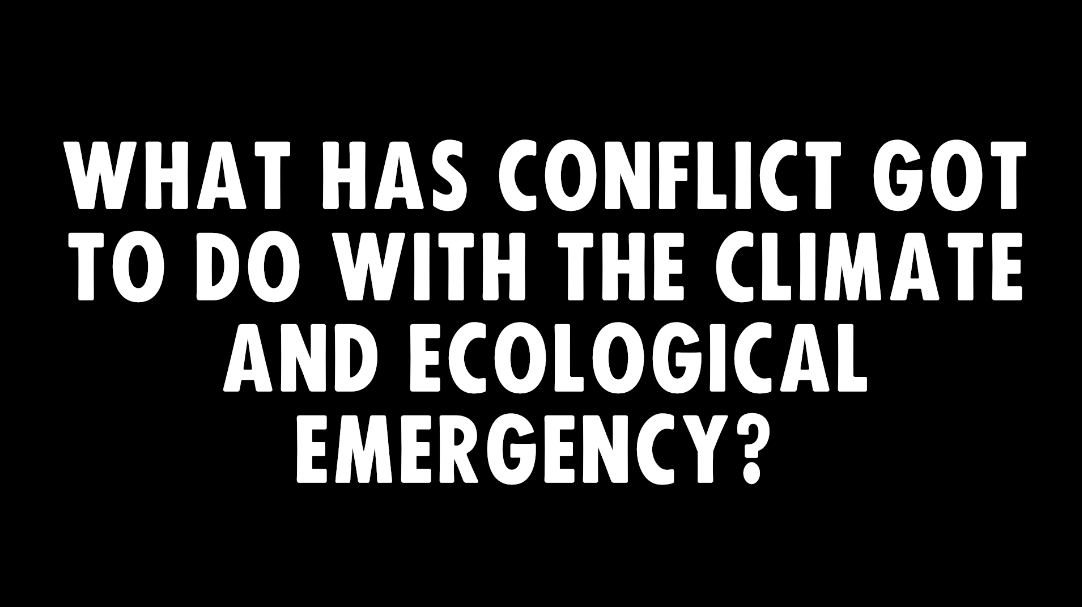](https://rebeltoolkit.extinctionrebellion.uk/uploads/images/gallery/2024-04/wap-2.PNG)
See the Slideshow of this document to see the sources and references for the information on this page.
#### What are these messaging guidelines for?
There is a strong link between the climate and ecological emergency and conflict, but it is not a simple or linear one and so it is not one that people can always automatically connect to.
- Of the 25 most climate-vulnerable nations, over half are already in conflict. A 2019 study from Stanford University found climate change contributed to between 3% to 20% of conflicts over the last century with the potential influence set to increase substantially due to warming global temperatures.
- The Darfur conflict in Sudan is the first acknowledged "climate change conflict" triggered by ecological crises, drought, and rapid desertification, but almost certainly will not be the last.
- War harms biodiversity in many ways, affecting land and natural resources, and contributing to the extinction and loss of species. Over 90% of the major armed conflicts between 1950 and 2000 occurred within countries containing biodiversity hotspots, and more than 80% took place directly within hotspot areas.
Just as the UK profits from the climate and ecological emergency, it profits from conflicts. Banks such as Barclays are investing in arms just as much as they are fossil fuel projects. The media creates a hierarchy of suffering, focusing time and attention on some conflicts and neglecting others – many of the conflicts happening in the world are rarely mentioned in the UK. A powerful thing rebels can do is redress this balance.
Peace and stability is essential for effective and timely climate action and adaptation by countries around the world. As Extincion Rebellion the most significant contribution we can make is to continue to apply pressure to the UK government to give power back to the people.
It is hoped these resources will empower you to speak with confidence about the connection between the climate and ecological emergency and conflict. If you need any additional support, please contact media@rebellion.earth
[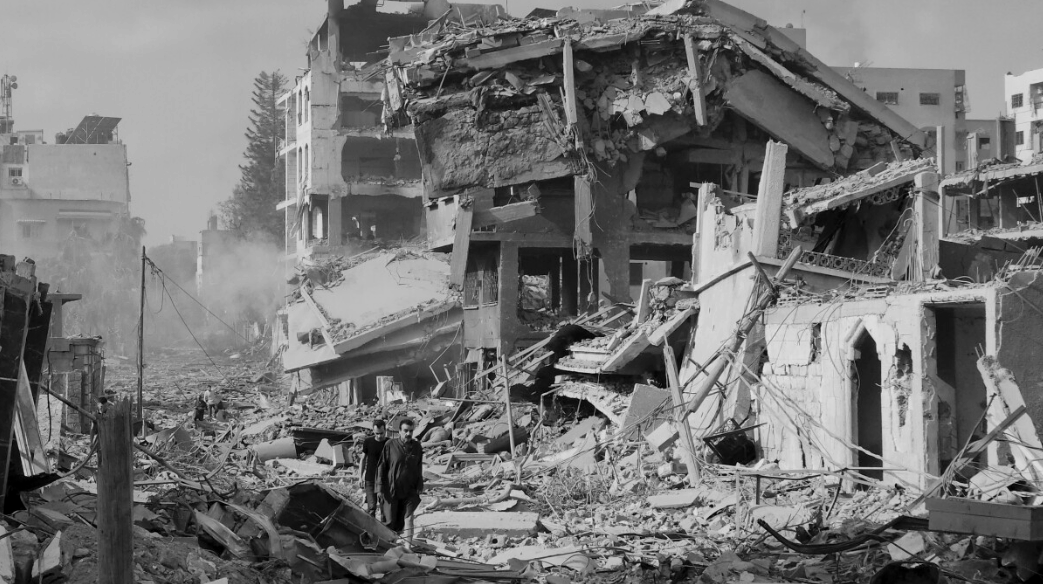](https://rebeltoolkit.extinctionrebellion.uk/uploads/images/gallery/2024-04/wap-3.PNG)
The climate and ecological emergency (CEE) is the ultimate expression of the crisis in our politics and our society. Both the CEE and conflict are rooted in oppression, both historic and current, and perpetuated by institutions and corporations entwined in a web of exploitation that profits from injustice. Unifying factors - such as exploitation, colonialism, racism and poverty bind these issues together, as those on the frontlines of the climate and ecological emergency are also likely to be suffering from violence and oppression.
#### It's all connected
There is already data that suggests that the number of conflicts is rising, along with the global temperature increase. This is a trend we are likely to see continue as the earth continues to heat, and the impacts of the climate emergency become more acute. Conflict over resources, destabilising of regimes and natural disasters will all exacerbate the situation.
“We are facing the highest number of violent conflicts since 1945. From Yemen to Syria, Myanmar and Sudan. From Haiti to the Sahel and on and on.” - Antonio Guterres, Secretary General of the UN.
[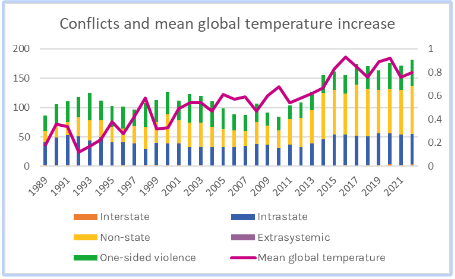](https://rebeltoolkit.extinctionrebellion.uk/uploads/images/gallery/2024-04/image-1712579916794.png)
- Interstate: A conflict between states
- Intrastate: A conflict between a state and a non-state armed group inside the state’s territory
- Extrasystemic: A conflict between a state and a non-state armed group outside the state’s territory
- Non-state: A conflict between non-state armed groups, such as rebel groups, criminal organizations, or ethnic groups
- One sided violence: The use of armed force by a state or non-state armed group against civilians
#### Today's Armed Conflicts
Afghanistan, Azerbaijan, Burkina Faso, Cameroon, Central African Republic, Columbia, Cyprus, Democratic Republic of the Congo, Egypt, Ethiopia, Georgia, India, Iraq, Israel, Libya, Mali, Mexico, Moldova, Morocco, Mozambique, Myanmar, Nigeria, Pakistan, Palestine, the Philippines, Russia, Senegal, Somalia, South Sudan and Sudan, Syria, Turkey, Ukraine, Western Sahara, Yemen.
Source: Today’s Armed Conflicts - The Geneva Academy of International Humanitarian Law and Human Rights
#### Key Facts
- A 2019 study from Stanford University found climate change contributed to between 3% to 20% of conflicts over the last century with the potential influence set to increase substantially due to warming global temperatures.
- The World Food Program USA recognises that conflict and climate change are the two things driving most of the hunger in the world - but doesn’t talk about the overlap between the two.
- Each of the five major high street banks – Barclays, HSBC, Royal Bank of Scotland, Lloyds TSB and Halifax Bank of Scotland (now a subsidiary of Lloyds) – invests in, issues loans to and serves as principal banker for British and international arms companies.
- If the world's militaries were a single country, they would rank as the fourth or fifth largest emitter in the world, following China, the United States, India, and the European Union.
- Britain has sent £1.5bn worth of military equipment to 39 of the world’s 40 most climate-vulnerable countries since 2008, potentially inflaming both war and the global environmental crisis.
- Media research shows it is thought wars in Africa are of little interest to the West because they are happening to people too far away, who are too different, living in countries that are not ‘important’ enough.
- Yemen’s civil war has been declared the “world’s worst humanitarian crisis.”. Throughout the country, a catastrophic cholera crisis has developed, little in the country is functioning, millions of people do not have enough food, and more than 10,000 people have been killed in conflict. Drought has exacerbated the conflict by drying up water sources, putting more than half of the population at risk of extreme water shortages - estimated to be over 10m people.
- Armed and intercommunal conflict in the east of the DRC is a key driver of displacement, causing mass population movement and rendering local communities, refugees and internally displaced persons (IDPs) even more vulnerable to the impacts of climate change.
- The planet-warming emissions generated during the first two months of the war in Gaza were greater than the annual carbon footprint of more than 20 of the world’s most climate-vulnerable nations.
- The large-scale exploitation of oil by foreign companies operating in the theatre of war in southern Sudan is reported to have increased human rights abuses there and has exacerbated the long-running conflict, a conflict marked already by gross human rights abuses—two million dead, four million displaced since 1983—and recurring famine and epidemics.
- Landmines and other explosive remnants have directly killed many animals, including elephants in Sri Lanka, snow leopards in Afghanistan, tigers in Cambodia, gazelles in Libya, camels in China, and water buffalo in Vietnam.
- “In our rapidly changing world climate change – and its potential to trigger both violent conflict and mass migration – needs to be considered as an urgent priority for policymakers and business leaders alike.” Environmental Justice Foundation (EJF) director, Steve Trent 17
More facts can be found in the War and Peace doc and the spokesperson briefing. These will continue to be added to over time.
[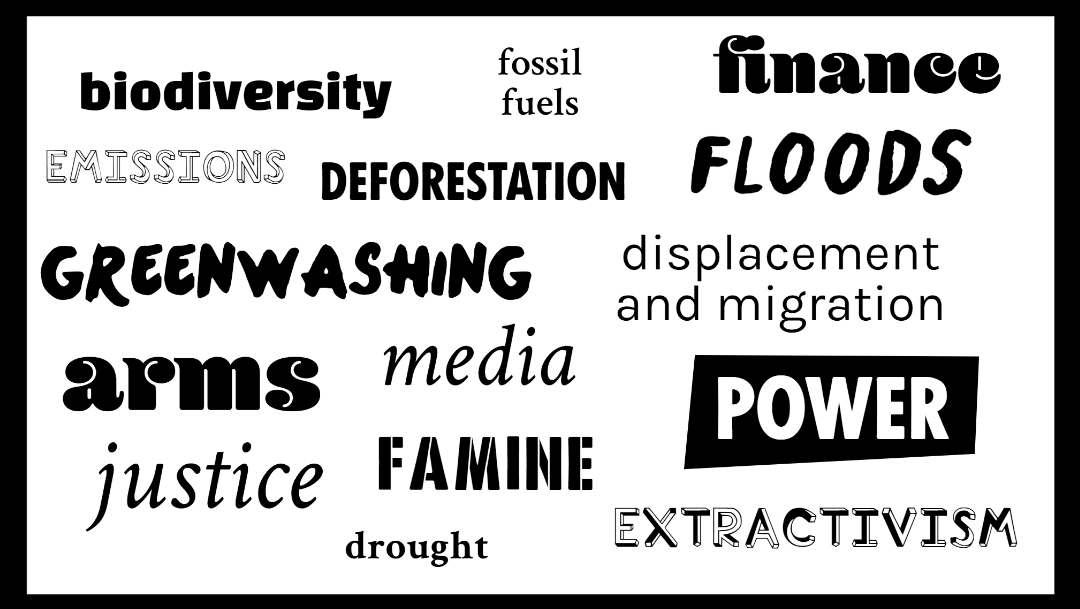](https://rebeltoolkit.extinctionrebellion.uk/uploads/images/gallery/2024-04/wap-5.PNG)
#### How are XRUK speaking about conflict?
Considerable thought from many teams has gone into this, and it is included here as a resource for the consideration of local groups.
- We forefront the climate and ecological emergency. We do not lose our identity as a climate movement - if we cannot speak from that lens, it is likely not the right topic for us. We do not have to speak about everything.
- We do not place one conflict above others This is a challenge, especially when we feel the moral imperative to speak about the horrors we currently see on the news. But actually this makes it all the more important to highlight the range of conflicts ignored by the media.
- We highlight the theme of unequal participation in power Speaking about conflict doesn’t absolve us of the need to always highlight our Third Demand in our messaging.
- We do not use the slogans of others. We use our own voice, explicitly making links to exacerbating climate impacts and consequential ecological disasters of conflict and do not reduce complexities of conflicts to taglines.
- We make space for the voices and experiences of those involved in conflicts. The diaspora community are a vital connection to this conversation, and a part of our strategy that has not yet achieved its potential.
- We do not become partisan or use messaging that picks sides We embrace a clear and unifying call for peace.
The events of October and 7th and beyond promoted a lot of conversation across the movement about how we could and should talk about this as XRUK.
There are so many people who are already doing work here, it is not for Extinction Rebellion to take that and make it our own. We should be supporting them, in a way that complements our aims as XR. .
One of our strengths as Extinction Rebellion is that we do not take a partisan stance, we do not pick sides. We are always guided by our three demands and principles and values. What we can bring of value to this conversation is to continue to unite people.
#### What does solidarity look like?
Solidarity takes many forms, and you should be sensitive to the feelings of the groups you are working with including rebels in your local group. You should seek to establish consent of your group, before embarking on potentially contentious actions or alliances. Many other groups may be happy for rebels to turn up at their events with flags and banners, or they may wish for you to not identify yourselves as XR. It is important to have conversations with your local group so you all know where the lines are for you, and others you are engaging with.
Some rebels will choose to take action with other groups, not as XR. The ecology of movements is a beautiful and varied thing, and there is a place for everything and everyone. We do not need to make everything about us.
The most important thing to remember as you nurture these relationships is that they are not ones that are for the duration of a topic being in the public consciousness - genuine and authentic solidarity carries on long after conflict has dropped out of the media cycle and stopped trending on social media.
It is important to remember that if we are identifying ourselves as Extinction Rebellion, we should be upholding our principles and values at all times. Not all groups we interact with hold our same commitment to nonviolence, in words or in deed. This may be in the form of chants or other behaviour we do not expect. Check out the [de-escalation resources on the toolkit.](https://rebeltoolkit.extinctionrebellion.uk/link/1303#bkmrk-page-title)
#### More Resources
- War and Peace full document- further reading
- War and Peace XR spokesperson briefing
- Source: Today’s Armed Conflicts - The Geneva Academy of International Humanitarian Law and Human Rights
- See the slideshow of this document to see the sources and references for the information on this page.
- Understanding Antisemitism and Islamophobia in the context of Israel and Palestine
# Guidance on Proscribed Organisations
As you can imagine, XRUK is deeply concerned about the Government's proscription last week of a nonviolent direct action group against the genocide in Palestine.
The implications for the right to protest are troubling and we have developed the following policy and guidance. We believe it is the best course of action to keep everyone safe.
We will continue to evaluate the situation as it develops.
#### Legal Briefing: references to proscribed organisations and to Palestine.
You will all be aware of the recent proscription of a direct action group in the UK. There is a very useful overview of this by CAGE that can be found [here](https://www.cage.ngo/articles/know-your-rights-palestine-action-proscription).
Under the Terrorism Act 2000 it is an offence to:
* belong, or profess to belong, to a proscribed organisation in the UK or overseas. [Section 11 TACT](https://eur02.safelinks.protection.outlook.com/?url=https%3A%2F%2Fwww.legislation.gov.uk%2Fukpga%2F2000%2F11%2Fsection%2F11&data=05%7C02%7CJoshua.Coupe%40met.police.uk%7C9b69bb1a586145affa9e08ddbba601cf%7Cf3ee2a7e72354d28ab42617c4c17f0c1%7C0%7C0%7C638873043847020915%7CUnknown%7CTWFpbGZsb3d8eyJFbXB0eU1hcGkiOnRydWUsIlYiOiIwLjAuMDAwMCIsIlAiOiJXaW4zMiIsIkFOIjoiTWFpbCIsIldUIjoyfQ%3D%3D%7C0%7C%7C%7C&sdata=VT3Q3nuFZhtfUJKKY%2FuF%2B6CPF9bH7y3PJsl18or8P0w%3D&reserved=0)
* express an opinion or belief that is supportive of a proscribed organisation. [Section 12(1A) TACT](https://www.legislation.gov.uk/ukpga/2000/11/section/12)
* arrange, manage or assist in arranging or managing a meeting in the knowledge that the meeting is to support or further the activities of a proscribed organisation, or is to be addressed by a person who belongs or professes to. [Section 12(2) TACT](https://www.legislation.gov.uk/ukpga/2000/11/section/12)
* wear clothing or carry or display articles in public in such a way or in such circumstances as to arouse reasonable suspicion that the individual is a member or supporter of a proscribed organisation. [Section 13 TACT](https://eur02.safelinks.protection.outlook.com/?url=https%3A%2F%2Fwww.legislation.gov.uk%2Fukpga%2F2000%2F11%2Fsection%2F13&data=05%7C02%7CJoshua.Coupe%40met.police.uk%7C9b69bb1a586145affa9e08ddbba601cf%7Cf3ee2a7e72354d28ab42617c4c17f0c1%7C0%7C0%7C638873043847035130%7CUnknown%7CTWFpbGZsb3d8eyJFbXB0eU1hcGkiOnRydWUsIlYiOiIwLjAuMDAwMCIsIlAiOiJXaW4zMiIsIkFOIjoiTWFpbCIsIldUIjoyfQ%3D%3D%7C0%7C%7C%7C&sdata=fI7TfgBNGTiMoDZZRcRuz%2F5Zwxu2o%2FyU0YtER5PznKg%3D&reserved=0)
* publish an image of an item of clothing or other article, such as a flag or logo, in the same circumstances. [Section 13(1A) TACT](https://eur02.safelinks.protection.outlook.com/?url=https%3A%2F%2Fwww.legislation.gov.uk%2Fukpga%2F2000%2F11%2Fsection%2F13%23%3A~%3Atext%3D%255BF2-%2C(1A)%2C-A%2520person%2520commits&data=05%7C02%7CJoshua.Coupe%40met.police.uk%7C9b69bb1a586145affa9e08ddbba601cf%7Cf3ee2a7e72354d28ab42617c4c17f0c1%7C0%7C0%7C638873043847048512%7CUnknown%7CTWFpbGZsb3d8eyJFbXB0eU1hcGkiOnRydWUsIlYiOiIwLjAuMDAwMCIsIlAiOiJXaW4zMiIsIkFOIjoiTWFpbCIsIldUIjoyfQ%3D%3D%7C0%7C%7C%7C&sdata=OzHwSeGuM6FiJbbIdygnPEt5bdkmyesyeUstmueL%2Fm0%3D&reserved=0)
**Penalties can be found [here](
https://www.sentencingcouncil.org.uk/sentencing-and-the-council/about-sentencing-guidelines/about-published-guidelines/sentencing-of-terrorism-offences/)**
Penalties can range from a fine, to 6 months imprisonment, to up to 14 years in prison for the more serious offences.
### Guidance for Local & Community Groups
Please refer to this **guidance document** intended to provide local and community groups, who sit outside of the XR Proscribed Groups Policy, with information and suitable guidance to minimise the risk to all Rebels.
Contact [xr-legal@riseup.net](mailto:xr-legal@riseup.net).
In an XRUK Working Group?
**XRUK has adopted a stricter internal policy, which applies to teams such as UK M&M and others, in order to protect rebels within the movement.**
The following guidelines are to apply where anything is to go onto any of XR UK (i.e circles within the Hive) outward-facing channels on the internet, social media or printed/physical media.
Individuals are entitled to do what they like in their own name, however if you are posting on behalf of XRUK it is important to be compliant with the following. Sister groups, community groups, regions, nations or local groups are invited to consider the following, in order to not put XR and fellow Rebels at risk.
* There should be no references whatsoever to any proscribed organisation or any links to any actions in relation to that group.
* If you plan to post about the genocide in Palestine, this is of course lawful but there should be no reference to Palestine Action. If you have any queries or concerns you are welcome to email XR legal on [xr-legal@riseup.net](mailto:xr-legal@riseup.net)
* This applies to all social media and internet posts, website, published and printed media and assets, creation and storage of physical materials as well as any broadcast and messaging channels.
* This also applies to signing open letters in the name of XRUK.
* If, retrospectively, a post is considered to be risky by the Legal team then it must be removed from our social media, internet site, broadcast channels, or printed/physical media.
* If there are any proposed changes to this policy, XRUK Legal must be consulted and involved in the process.
* XRUK funds may not be allocated to any group or individual where there is a credible risk that such funds could be perceived as supporting a proscribed organisation, either directly or indirectly. Relevant funding decisions must follow XRUK Legal guidance and the [IBG–Finance Proscribed Groups Policy](https://docs.google.com/document/d/1qohL3PyX-uDmLlUoghoAVVrFaTQmfiPBxizq6ZbuNR8/edit?tab=t.0).
* This advice is in line with [Principle and Value 9](https://rebeltoolkit.extinctionrebellion.uk/books/xr-uk-ways-of-working-and-constitution/page/principles-and-values), which establishes that we avoid exposing fellow rebels to legal Risk without their consent.
